


ProtonVPN vs. PIA, which is the best VPN? Private Internet Access is the best option as it offers excellent security and privacy. It is also faster and more reliable. But still, ProtonVPN is a worthy choice as it’s also secure and tags along with several unique extras.
ProtonVPN and Private Internet Access (PIA) are two household names in the VPN industry. They share quite a lot in common, but profound differences should inform your purchase decision.
The difference between ProtonVPN and Private Internet Access is the protocols supported, privacy, server network, speed, and support. ProtonVPN supports 4 protocols and has a proprietary protocol. It guarantees privacy as it’s in a privacy-friendly jurisdiction and has an audited log policy. However, it’s slower, has a smaller server network, and has poor customer support. On the other hand, PIA works with 5 protocols, doesn’t guarantee online privacy as it’s based in the US, has an extensive server network, and has relatively faster speeds. In addition, the customer support is reliable compared to ProtonVPN’s.
For more regarding how the two compare, keep it right here.


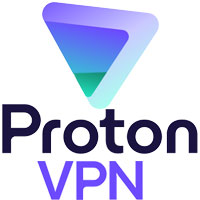
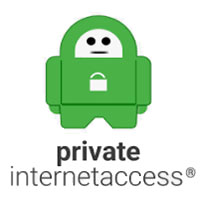


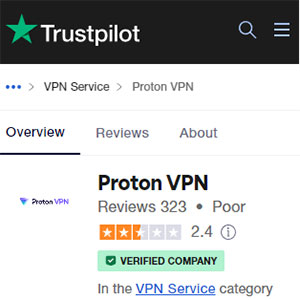
Established in 2017, ProtonVPN is owned by Proton AG, an employee-owned cybersecurity firm. It is backed by FONGIT, a not-for-profit foundation financed by the Swiss Federal Commission for Technology and Innovation alongside the European Commission.
It is a trusted VPN provider that boasts over 70 million users worldwide. We checked VPN forums, Reddit, and other platforms. We are glad it has quite a good reputation save for a few complaints from dissatisfied users, which is not unusual.
At the time of writing, the VPN has a Trustpilot Trustscore of 2.4 after over 240 reviews. It’s worth noting that most negative reviews emanate from billing issues and poor customer service.
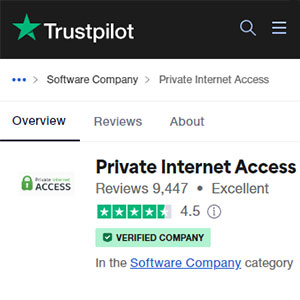
Private Internet Access, on the other hand, was established in 2010. Kape Technologies, the same venture behind other top-rated VPNs, including CyberGhost, ExpressVPN, and ZenMate, owns the company.
Private Internet Access company has remained a top VPN brand for over 10 years and boasts over 15 million users. We also did thorough background checks on the company, and we are glad it has a good reputation. It has been praised by both cybersecurity experts as well as users.
At the time of writing., PIA has a Trustpilot Trustscore of 4.6/5 after close to 9,000 reviews which is very impressive.
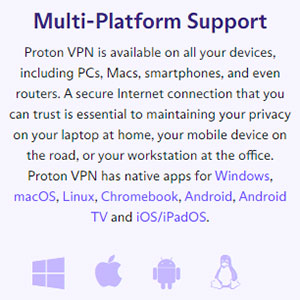
ProtonVPN is a versatile VPN that works with multiple devices. There are apps for PCs, including Windows, Linux, and macOS.
Besides PCs, it works with Android and iOS devices.
You can also connect other devices, for example, routers, Smart TVs, Fire TVs, Xbox, PlayStation, etc.
When it comes to the number of devices you can connect simultaneously, ProtonVPN allows a maximum of 10, but you can add more devices via an already-connected router.
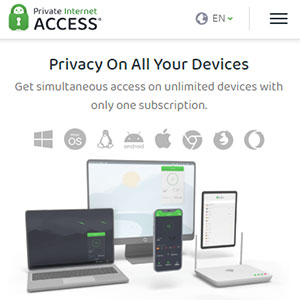
Private Internet Access also excels when it comes to supported devices. It works with several PC platforms, including Windows, Linux, Debian, and macOS. There are also apps for Android and iOS mobile devices.
Besides PC and mobile protection, this VPN is also compatible with Smart TVs, Apple TVs, routers, PlayStation, Xbox, and so on.
Regarding the allowed simultaneous connections, PIA allows 10 simultaneous connections. You can, however, add more devices via a connected router.
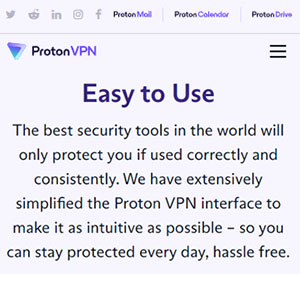
ProtonVPN has excellent usability. To get started, click the ‘Get ProtonVPN Now’ button.
It redirects to the plans page, where you must select a preferred plan and create an account. The next step is adding a payment method and checking out. Now that you have a subscription, download, install, and launch the software.
Then log in and select a server; it’s that simple. The VPN’s user interface is intuitive, while the menu is pretty straightforward.
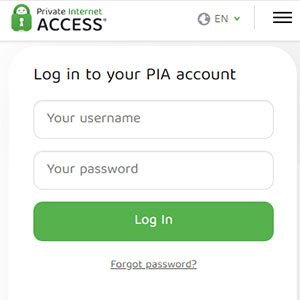
Private Internet Access is also a user-friendly VPN. Getting started is pretty simple. First, click the ‘Get VPN’ button redirecting to the plans page, where you have to select a preferred plan.
Then, add a payment method and complete the order. The next step will be creating an account, downloading and installing the software, and logging in.
You are all set now. The VPN’s user interface is also clean, with straightforward navigation and menu.
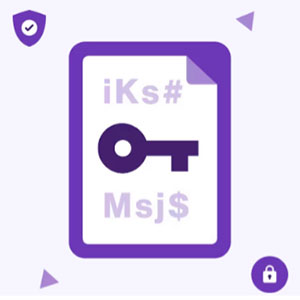
ProtonVPN, one of the best VPNs out there, deploys state-of-the-art AES 256-bit encryption, the same encryption used by top government and banking institutions.
Systems secured using this encryption are impenetrable. It takes security a notch higher courtesy of 4096-bit RSA keys and HMAC with SHA384 for authentication.
There’s also a Diffie-Hellman key that securely exchanges cryptographic keys.
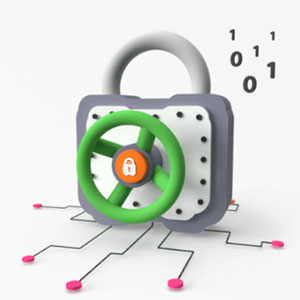
Private Internet Access also guarantees security courtesy of AES 256-bit encryption.
The VPN also works with AES 128-bit encryption which is less secure but offers faster speeds. With AES 256-bit encryption, you are guaranteed military-grade security.
PIA’s encryption is complemented by ECC-256k1/256r1/521 and RSA-2048/3072/4096 handshake options.
| IKEv2 | |
| OpenVPN | |
| WireGuard | |
| WireGuard | |
| PPTP | |
| L2TP/IPsec |
ProtonVPN works with 4 protocols; IKEv2, OpenVPN, WireGuard, and Stealth. IKEv2 offers decent speeds and security by implementing forward secrecy with a Diffie-Hellman key. OpenVPN, the industry standard, on the other hand, offers excellent security, while WireGuard is engineered for ultrafast speeds. Last is Stealth, which, as the name suggests, bypasses internet censorship and VPN blocks as it disguises your VPN connection. Also with mentioning is Smart Protocol, a feature that automatically probes networks and suggests the best VPN protocol configuration.
| IKEv2 | |
| OpenVPN | |
| WireGuard | |
| WireGuard | |
| PPTP | |
| L2TP/IPsec |
Private Internet Access works with 5 protocols; PPTP, L2TP/IPsec, IKEv2, OpenVPN, and WireGuard. PPTP is a fast protocol for old devices, while L2TP/IPSec encrypts the data twice, making it more secure than PPTP. SSTP, on the other hand, can bypass even those firewalls that block L2TP connections but works with Windows platforms only. IKEv2 is stable and secure, while OpenVPN is a secure protocol that works with all devices. Last is WireGuard, which offers fast speeds and performance.
ProtonVPN comes with DNS Leak Protection, so you can be sure that all your DNS queries won’t leak. Another feature is a network kill switch that comes in handy when your VPN connection drops, as it also drops the internet connection immediately so your traffic won’t leak.
There’s also split tunneling that lets you route some connections via the VPN while excluding others. One unique feature is Secure Core architecture which deploys Secure Core servers that work like MultiHop to add an extra layer of security to your connection by routing your traffic via double VPNs.
Other features worth mentioning include Perfect Forward Secrecy, which generates a new key for each connection, Always On VPN, which restores the VPN connection in case of interruption, and Tor Over VPN, which routes your traffic via the Onion network.
Private Internet Access also comes with DNS/WebRTC/IP Leak Protection, preventing your IP or DNS queries from leaking. The VPN also has a network kill switch, so whenever the VPN connection drops, the internet connection, too, drops immediately.
You can also choose apps whose traffic should be routed via the VPN and apps whose traffic can connect directly to the internet, courtesy of split tunneling. Another great security extra is Ad & malware blocking, which keeps ads and malware at bay.
There’s also a SOCKS5 proxy that further enhances security by sending data packets from the server to the client using protected authentication. Port Forwarding is also supported. It allows incoming traffic to get around the NAT Firewall, speeding up the connection. Last is PIA Mace, which blocks specific domains.
ProtonVPN is based in Switzerland, a privacy-friendly country not part of any surveillance organizations such as the 5, 9, and 14 Eyes. The country has strong privacy laws and doesn’t have any mandatory data retention laws.
Unfortunately, Private Internet Access is based in the United States, a founding member of the 5-Eyes alliance. The United States is also notorious for snooping on users’ online activity. Even though there are no mandatory data retention laws, the government can request ISPs to log users’ data for 180 days.
ProtonVPN guarantees online privacy as it is a no-log VPN. The company doesn’t collect or store any personally identifiable information that could be used to track or profile you, for example, your browsing activity, traffic, real and assigned IP address, session length, etc.
For the record, ProtonVPN’s log policy is credible as 3rd parties have audited it. Besides, it deploys servers with full-disk encryption to secure data.
Even though it is based in the United States, Private Internet Access doesn’t keep logs of your activity.
This is court-proven. The company only collects your email address, temporary cookies, and payment information. It does not log any personally identifiable information, such as browsing activity, IP addresses, timestamps, etc.
However, you should be worried as the government can ask ISPs to log data for 180 days. The good thing is that the company deploys RAM-only servers which wipe all data with every reboot.
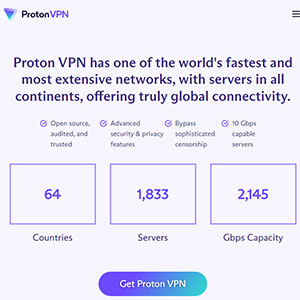
ProtonVPN has a vast server network with 1900+ highly specialized servers in 67 countries. These servers boast high-end hardware for speed and reliability, with full disk encryption. There are several types of servers.
First is Secure Core servers which route network traffic in privacy-friendly countries. There are also Plus servers which are full-featured servers but are accessible to Plus plan users only. Plus Servers are optimized for streaming and support P2P activity and torrenting. They also come with Netshield and support Tor Over VPN.
There are also Free servers, but in just 3 countries. Most of the servers offer fast speeds and have 2Gbps ports, while select servers have 10Gbps ports for the best speeds.
To help you connect to the best servers, a feature dubbed Quick Country Selector connects you to the best servers depending on your location.
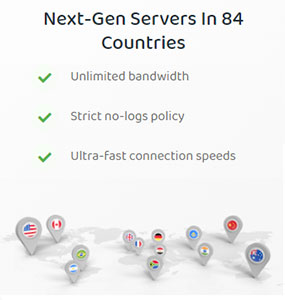
One of the advantages of PIA is the extensive server network of 35000+ servers in 83 countries.
They also boast top-of-the-line hardware for reliability and speed. One interesting thing is that they are all RAM-only servers owned by the company.
Regarding speed, these servers have 10Gbps ports for seamless streaming, gaming, and torrenting. Besides, they have no bandwidth caps.
Also worth mentioning is the Smart Location feature that selects the best server for you.
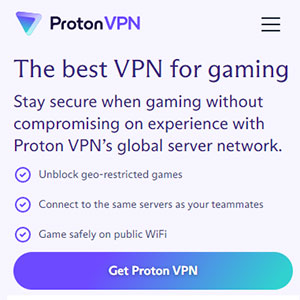
ProtonVPN is a good VPN for streaming courtesy of streaming-optimized servers available on the Plus, and Unlimited plans. It unblocks most popular streaming sites with geo-locked content, for example, Netflix US, UK, Canada, and Japan. Besides Netflix, the VPN also works with Hulu, BBC iPlayer, Amazon Prime Video, HBO, Crunchyroll, and DAZN, among others. You can also rely on this VPN to torrent without risks of bandwidth throttling and IP blocks. We managed to get all our files, and the speeds were decent. All this is courtesy of the select P2P servers, Perfect Forward Secrecy, VPN Over Tor, and Secure Core servers. Last, on gaming, this VPN is secure enough to shield you from DDoS attacks and other threats. Besides, you can rely on it to access geo-restricted gaming content. However, the speeds were not up to the mark when playing Call of Duty, as the pings shot to around 31ms.
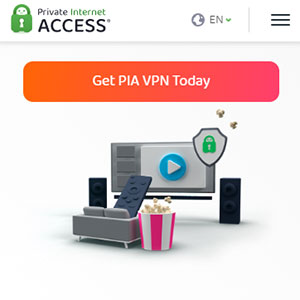
Private Internet Access is also reliable when it comes to streaming. It also comes with streaming-optimized servers that unblock several Netflix libraries, including Netflix UK, US, Canada, and Japan. It works with several other sites, including Hulu, HBO Max, Disney+, Crunchyroll, Amazon Prime Video, and DAZN. When it comes to torrenting, it is also up to the task. We launched several sessions and got our files in record time with no bandwidth throttling or IP bans. On gaming, it can also protect you from DDoS attacks and facilitate access to geo-restricted gaming content and discounts. However, there is room for improvement in performance as the speeds can’t match that of NordVPN and ExpressVPN. When playing Call of Duty, the average ping was 26ms which is fair.
Unfortunately, ProtonVPN doesn’t have a robust customer support infrastructure. There is no live chat or email. The only avenue you can explore is the help center with a knowledge base and FAQs. This is disappointing, especially when you can’t find answers to your queries.
On the other hand, PIA has multichannel customer support. The best option is the 24/7 live chat that offers instant feedback. Besides live chat, you can opt for the email ticketing system. The company also has detailed guides, tutorials, and FAQs with answers to frequently asked questions.
ProtonVPN has a free plan and is among the best free VPNs, despite limiting users to just 3 countries. There is also a 7-day free trial, so you can test the full features before committing. The company is also generous enough to offer a 30-day money-back guarantee just in case you are unsatisfied with the service.
Regarding paid plans, there are 3; a 1-month plan for $9.99 a month, a 12-months plan for $5.99 a month billed yearly, and a 24-months plan at $4.99 a month billed biannually.
The available payment methods include all the popular credit and debit cards, Bank Transfer, and PayPal. You can also opt for cryptos such as Bitcoin for under-the-radar payments. But there’s a catch; you must first opt for the free plan and then upgrade to pay with Bitcoin.
Unfortunately, Private Internet Access doesn’t have a free plan. However, there is a 7-day free trial for iOS and Android devices and a 30-day money-back guarantee.
As for the paid plans, there are 3; a 1-month plan for $11.95 a month, a 12-months plan for $3.33 a month billed annually, and a 36-months plan for $2.03 a month billed every 3 years.
When it comes to payment methods, there are plenty of options, including Visa, MasterCard, Amex, Discover, JCB, PayPal, BEAM, and Amazon Pay. Crypto payments are also available. You can pay using Bitcoin, Zcash, Ethereum, and Litecoin.
That’s the end of this ProtonVPN vs. PIA comparison review. As you have seen, both providers guarantee security courtesy of banking-grade AES 256-bit encryption. They also work with multiple devices and support up to 10 simultaneous connections.
But which one should you go for? Well, if you are after online privacy and reliable streaming, ProtonVPN is the best match. It is in a privacy-friendly jurisdiction and has an audited no-log policy. It is also reliable when it comes to streaming.
As for those looking for speeds and security, Private Internet Access should be on top of the wishlist as it is faster than ProtonVPN, making it suitable for torrenting and P2P sharing, and gaming. PIA also has a good mix of security features, including SOCKS5 proxy, Port Forwarding, Ad & malware blocking, PIA Mace.